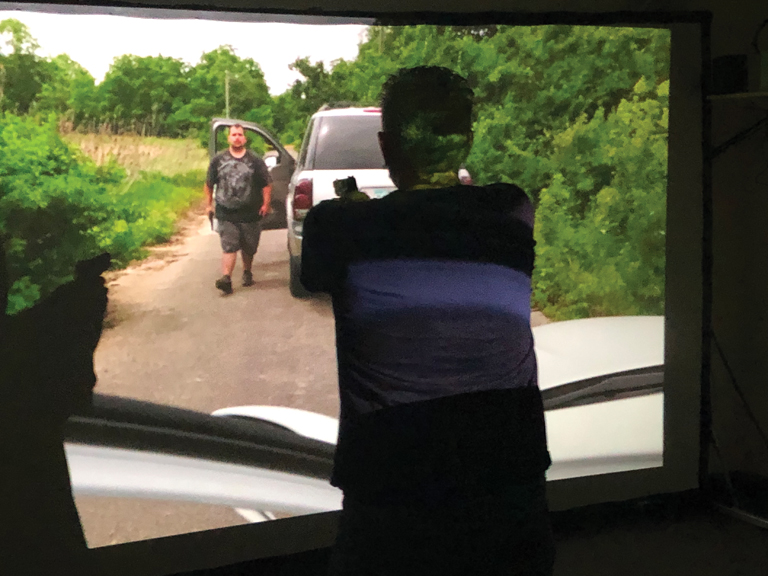
Andre Ordubegian of the Montrose Shopping Park Assn. took part in a training exercise as a member of the Advisory Panel.
By Mary O’KEEFE
The Glendale Police Community Advisory Panel met on Saturday to learn how police respond to situations, how they are trained and how misconceptions affect the department.
The Advisory Panel has been a part of the GPD for several years; however, in 2012, the committee was put on hold. But when Carl Povilaitis was named the GPD chief of police last year he wanted to bring it back.
“When Chief Povilaitis came in [as chief] this is one of the very first things he wanted to do,” said Sgt. Dan Suttles.
Suttles was tasked with reaching out to community leaders and inviting them onto the panel.
“The whole purpose is to bring up specific subjects that will generate conversations,” Suttles said.
It is not just having police talk to community members but to also have a dialogue, and at times debate, as to how police in Glendale do their job and address concerns within the community.
“The purpose is also to have better communication with community leaders,” he added.
Community leaders are tasked with relaying what they have learned from the panel to community members. The panel meets quarterly and covers a variety of subjects, like an upcoming topic of homelessness and how police work with medical technicians, the city and organizations.
Andre Ordubegian, president of the Montrose Shopping Park Association, is part of the Advisory Panel representing the MSPA.
“[GPD] was recruiting people from MSPA [to be on the panel] and I volunteered,” he said. “It is important to support our police department and find out how [they work] and to let everyone know what they go through.”
He said what he has learned is how much training officers have to go through, how some people judge their actions and how they are often not portrayed correctly.
“We are all living in this beautiful city, we are all living together and we have to find ways to bring us together,” he said.
One of the best ways to work together, Ordubegian said, is through these types of outreach programs.
“This creates an environment where we can educate ourselves that certain situations require certain actions,” he said. “Not to justify anything, but to understand and know [the process] better.”
Ordubegian added the MSPA, like many other organizations, is becoming more concerned about safety and wants to be proactive, working with the police on ways to keep the community safe.
Roberta Parker was on hand representing the Mary Pinola/Community Foundation of the Verdugos. Parker said she is a pretty compliant person but wanted to see what officers go through in coping with today’s issues.
“My husband was with the Glendale Police Dept. in the 1970s,” she said.
As the wife of a member of the GPD, she knew a lot about the trials and tribulations of being an officer. The Advisory Panel has allowed her to relearn how police do their job.
“But it is such a different climate now,” she added.
She added that each community seems to approach the police differently.
One of the questions from the panel was how GPD officers get help for the psychological pressures that are part of their job.
“We have always had a psychologist on retainer but we just changed that to a group of psychologists,” said Chief Povilaitis.
They also have included wellness training for their officers.
“The [job] comes with a certain amount of stress. There are constructive ways to cope with it and unfortunately there are non constructive ways to cope,” he said.
The psychologists are on call not only for the police officers but also for their families.
On Saturday the Advisory Panel members got a chance to experience some of what GPD officers face in their day-to-day work. They saw videos that often land on social media that show one side of the situation, often filming that begins in the middle of an incident. Members also had a chance to experience a traffic stop through a digital simulation program.
One by one members of the Advisory Panel went into a room where they got into a police car and simulated a traffic stop. Ordubegian experienced the simulation.
“When I tell you to exit your police car, you’re on your own,” said Agent Keith Soboleski.
Ordubegian exited the police car.
“Step out of your car,” Ordubegian ordered.
The man in the simulation stepped out of the vehicle with a gun in his hand. The scenario then showed the man, who was obviously distraught, stating things like “She should have never done that to me.”
He continued to walk toward Ordubegian, who continued to tell him to stop. The man said, “I killed her and I killed him.”
He then drew his gun and shot.
“You’re dead,” Soboleski said to Ordubegian.
When they reviewed the simulation, Ordubegian realized that he did not hear everything the man said and, though he felt threatened, he paused in his actions giving the man enough time to fire at him.
The simulation, which is similar to the ones used to train officers, was realistic and gave Ordubegian and others on the panel an idea of how officers must analyze and respond to situations in a matter of seconds.
